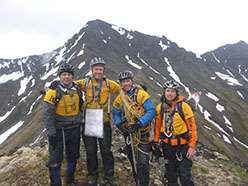Researchers track racers fighting sleep deprivation

QUT researchers are monitoring the sleep deprivation of some of the world's best endurance athletes as they race non-stop for up to 10 days, fighting off the "sleep monsters".
Known as the Adventure Racing World Series, teams of four people navigate their way through hundreds of kilometres of wilderness on bikes, kayaks and foot, testing their physical and mental capabilities to be the first past the finish line.
Sleep researcher from QUT's Centre for Accident Research & Road Safety - Queensland (CARRS-Q) Associate Professor Simon Smith said because the clock does not stop during the race, competitors usually forgo sleep in an effort to complete the expedition as quickly as possible.
"We've been told by competitors that they are in such a sleep deprived and fatigued state they can experience strange hallucinations," he said.
"Adventure racers have their own name for it - sleep monsters."
In a bid to better understand the effects of sleep deprivation during the race, Professor Smith said QUT recorded the activity, sleep duration, light exposure and heart rate along with surveys on fatigue, cognitive function, injury and recovery of four teams competing in the expedition event in Alaska recently.
"We used equipment to keep track of competitors 24/7, monitoring their sleep and the effect this had on their decision-making ability," Professor Smith said.
"This is important because sleep deprivation impacts on mental processing, balance, risk judgements, and other aspects of physical performance.
"If we can better understand how much sleep we need, and work out what our body does to cope without sleep, we can start looking for ways to overcome sleep deprivation."
One of the competitors taking part in the study, Brisbane-based Dr Liam St Pierre, said racing in the Alaskan summer meant experiencing 20 hours of daylight.
"As competitors we typically average two hours of sleep a night for a week, often forgoing sleep completely on the first and last night of the race," Dr St Pierre said.
"The impacts are both physical and mental. Obviously we are pushing our bodies on the edge of fatigue, but what is even harder is making critical decisions about navigation and safe route choice.
"There comes a point in every race when you are so sleep deprived that you start making multiple navigation errors and the pace slows to a crawl.
"You know then that it's time to crash out for a couple of hours."
Dr St Pierre said racing in Alaska presented some unique challenges in terms of sleep strategy for teams.
"Having nearly constant daylight during the race meant that we could pull up and sleep at almost any point on the course and not worry about losing valuable daylight hours when it is much easier to navigate.
"On day three of the race we had been on the go for 64 hours with less than an hour of sleep when we came across a crevasse-filled glacier on the course we needed to negotiate our way around.
"With weather conditions deteriorating, we had to make the call to bunk down for four hours sleep as we knew at that point we were in no condition to tackle that part of the course safely in our sleep deprived state."
The results of the data collected from Expedition Alaska are still being collated. QUT also monitored the Queensland expedition race held earlier this month.
















